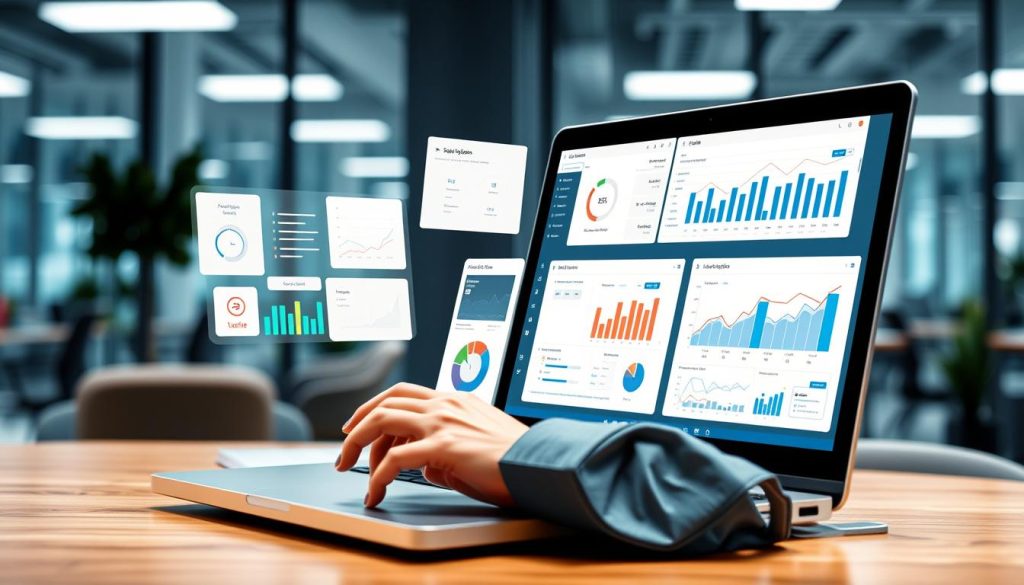As an independent professional, establishing a strong online presence is crucial for attracting clients and growing your business. With Google search being a primary source of information, understanding how search engines work can significantly enhance your visibility.
Google uses automated programs called crawlers to constantly explore the web and add pages to their index, resulting in a vast majority of sites being listed in search results without manual intervention.
By understanding the basics of site web search engine optimization, independent professionals can improve their online presence and attract more qualified leads.
Table of Contents
Key Takeaways
- Essential search engine optimization strategies for independent professionals.
- Practical techniques to enhance online visibility.
- Actionable tips to improve search results rankings.
- Basic and advanced optimization strategies without extensive technical knowledge.
- Methods to grow your business through organic search traffic.
Understanding SEO for Independent Professionals
In today’s digital landscape, SEO is essential for independent professionals. As more businesses move online, having a robust online presence has become crucial for success.
Search Engine Optimization, or SEO, is the process of improving the visibility and ranking of a website in search engine results pages (SERPs) through various techniques and strategies. A well-optimized website can significantly enhance a business’s online visibility.
What is Search Engine Optimization?
SEO involves optimizing a website to make it search engine-friendly, thereby improving its chances of being ranked higher in search results. According to Brightedge, 51% of a website’s traffic comes from organic search, far ahead of social networks which represent only 5%. This highlights the importance of SEO for any business, especially for independent professionals.
| SEO Benefits | Description |
|---|---|
| Level Playing Field | SEO allows independent professionals to compete with larger companies by focusing on targeted keywords. |
| Credibility and Trust | A strong SEO strategy helps build credibility and trust with potential clients. |
| High ROI | For independent professionals with limited marketing budgets, SEO offers a high return on investment. |
Why SEO Matters for Independent Professionals
SEO provides several benefits for independent professionals, including a level playing field to compete against larger companies, building credibility and trust with potential clients, and offering a high return on investment. Effective SEO creates a sustainable source of leads and inquiries that continues to deliver results long after the initial optimization work is complete.
By understanding and implementing SEO strategies, independent professionals can enhance their online visibility, attract more clients, and grow their business. As stated, « Organic search is considered to be the highest ROI channel by 49% of marketers, » emphasizing the critical role of SEO.
By focusing on SEO, independent professionals can ensure their website serves as an effective storefront, making it visible in search results and critical to their business success.
The Three Pillars of Search Engine Optimization
Effective Search Engine Optimization (SEO) is built upon three fundamental pillars that work together to enhance your website’s visibility and ranking. Understanding these pillars is crucial for independent professionals aiming to establish a strong online presence.
On-Page SEO
On-Page SEO refers to the practice of optimizing individual web pages to rank higher in search engines. This includes optimizing content, meta tags, headings, and internal linking. High-quality, keyword-rich content is essential for On-Page SEO, as it helps search engines understand the relevance and value of your page.
Some key On-Page SEO elements include:
- Keyword research and optimization
- Meta title and description optimization
- Header tags (H1, H2, H3) usage
- Content quality and depth
- Internal linking strategy
Off-Page SEO
Off-Page SEO involves actions taken outside of your website to improve its search engine ranking. The primary focus is on building your site’s authority and trustworthiness through high-quality backlinks from other reputable websites.
Key Off-Page SEO strategies include:
- Guest blogging and content collaborations
- Social media presence and engagement
- Influencer outreach and partnerships
- Reviews and ratings management
Technical SEO
Technical SEO guarantees that your site is technically efficient and complies with search engine criteria. It constitutes the skeleton of your site, ensuring that search engines can crawl, interpret, and index your content effectively.
| Element | Description |
|---|---|
| Site Speed Optimization | Improving your site’s loading speed to enhance user experience and search engine rankings. |
| Mobile-Friendliness | Ensuring your site is accessible and usable on mobile devices. |
| Secure Connections (HTTPS) | Protecting your site with a secure protocol to safeguard user data. |
| XML Sitemap and Robots.txt | Helping search engines understand your site’s structure and content. |
Setting Up Your SEO Strategy
For independent professionals, setting up an effective SEO strategy can significantly improve their visibility in search results. A well-structured approach enables you to optimize your website, making it more accessible and understandable to both search engines and users.
When you’re setting up or redoing your site, it can be beneficial to organize it in a logical manner. This helps search engines and users understand how your pages relate to the rest of your site, enhancing overall user experience and search engine crawlability.
Defining Your SEO Goals
Defining clear SEO goals is the first step towards a successful strategy. Identify what you want to achieve through SEO, whether it’s increasing website traffic, generating leads, or boosting sales. Specific, measurable, achievable, relevant, and time-bound (SMART) goals will guide your SEO efforts and help you stay focused.
Understanding Your Target Audience
Understanding your target audience is crucial for effective SEO. Analyze their search behaviors, preferences, and pain points to create content that resonates with them. This insight will help you develop a more targeted SEO strategy that meets their needs and improves your search engine rankings.
Analyzing Your Competition
Analyzing your competition is a vital step in setting up your SEO strategy. By studying your competitors’ strengths and weaknesses, you can identify gaps and opportunities in the market. Tools like SEMrush, Ahrefs, or Moz can facilitate this process, providing valuable insights into their keyword strategies, content approaches, and backlink profiles.
| Competitor Analysis Tools | Key Features | Benefits |
|---|---|---|
| SEMrush | Keyword research, competitor analysis, technical SEO audit | Comprehensive insights for SEO strategy development |
| Ahrefs | Backlink analysis, keyword research, content analysis | Detailed backlink profiles and content optimization suggestions |
| Moz | Keyword research, link building, SEO audits | Simplified SEO analysis and recommendations |
By understanding your SEO goals, target audience, and competition, you can develop a robust SEO strategy that enhances your online presence and drives business growth.
Keyword Research for Independent Professionals

As an independent professional, understanding and leveraging keyword research can significantly enhance your online presence. Keyword research is a fundamental aspect of SEO that helps you identify the terms and phrases your target audience uses when searching for services like yours.
Finding Relevant Keywords for Your Niche
The first step in keyword research is to identify relevant keywords for your niche. This involves brainstorming a list of potential terms and phrases that are closely related to your services. Keyword research tools will then provide you with data around these keywords, including search volume and competition metrics.
Long-Tail Keywords: Your Secret Weapon
Long-tail keywords are more specific phrases that have lower competition and higher conversion rates. For instance, instead of targeting a broad term like « freelance writer, » you might target « freelance technical writer for software companies. » This specificity can help you attract more targeted traffic to your website.
Keyword Research Tools for Beginners
Several free and affordable keyword research tools are available to help independent professionals identify valuable search terms. Some of the most useful tools include:
- Google’s Keyword Planner and Google Trends, which provide reliable data on search volume and keyword popularity trends.
- Third-party tools like Ubersuggest, Answer the Public, and KeywordTool.io, which offer insights into related terms and questions.
- For those ready to invest in more comprehensive data, tools like SEMrush, Ahrefs, and Moz provide detailed keyword metrics and competitive analysis.
The most effective keyword research combines data from multiple tools with your own industry knowledge and understanding of client needs.
Optimizing Your Website Structure

Optimizing your website’s structure is a fundamental step in enhancing your online presence. A well-structured site not only improves user experience but also significantly boosts your search engine rankings.
Creating a User-Friendly Site Architecture
A user-friendly site architecture is crucial for retaining visitors and encouraging them to explore your site further. This involves creating a clear hierarchy of pages and ensuring that your site is easy to navigate. By doing so, you enhance the overall user experience, which is a key factor considered by search engines when ranking websites.
Organizing Your Content in Logical Categories
Organizing your content into logical categories helps both users and search engines understand your site’s structure. This can be achieved by grouping related content together and using clear, descriptive headings. For instance, if you’re a freelance writer, you might have categories for different types of writing services or industries you specialize in.
URL Structure Best Practices
Your URL structure plays a significant role in how search engines and users perceive your site. Here are some best practices to follow:
- Use descriptive, keyword-rich URLs that clearly indicate the content of the page.
- Keep URLs relatively short while still being descriptive.
- Use hyphens to separate words in URLs for better readability.
- Maintain a consistent URL structure across your site.
For example, a URL like https://www.example.com/services/content-writing is more informative and user-friendly than https://www.example.com/page123.
| URL Structure Element | Best Practice | Example |
|---|---|---|
| Descriptive Keywords | Include relevant keywords | https://www.example.com/services/seo |
| URL Length | Keep it concise | https://www.example.com/about |
| Word Separation | Use hyphens | https://www.example.com/content-writing-services |
| Consistency | Maintain a uniform structure | https://www.example.com/blog/post-title |
On-Page SEO Techniques for Better Rankings
Independent professionals can significantly boost their website’s search engine rankings by implementing effective on-page SEO techniques. On-page SEO is a crucial aspect of a successful SEO strategy, as it helps search engines understand the relevance and quality of a website’s content.
Title Tag Optimization
Title tags are a vital element of on-page SEO, as they provide a concise summary of a webpage’s content. To optimize title tags, independent professionals should ensure they are descriptive, keyword-rich, and compelling. A well-crafted title tag can improve click-through rates and help search engines understand the page’s content.
Meta Description Best Practices
Meta descriptions provide an opportunity to entice users to click through to a webpage. Independent professionals should craft meta descriptions that are informative, engaging, and keyword-rich. A good meta description should be around 155-160 characters and include the primary keyword.
Header Tags (H1, H2, H3) Usage
Header tags (H1, H2, H3) play a crucial role in structuring content and highlighting important keywords. Independent professionals should use header tags to organize their content, making it easier for users and search engines to understand.
Content Optimization Strategies
Effective content optimization involves creating high-quality, keyword-rich content that addresses the needs of the target audience. Independent professionals should focus on producing well-researched, engaging, and regularly updated content to improve their search engine rankings.
Creating High-Quality Content That Ranks
The key to outshining competitors in search engine results lies in creating superior content. As an independent professional, your content is a reflection of your expertise and should be crafted to provide value to your audience.
Understanding E-E-A-T Principles
E-E-A-T stands for Experience, Expertise, Authoritativeness, and Trustworthiness. To create high-quality content, you must demonstrate these principles. Showcase your experience and expertise in your niche, establish your authority through well-researched content, and build trust with your audience by being transparent and credible.
Content Length and Depth Considerations
The length and depth of your content play a crucial role in search engine rankings. While there’s no one-size-fits-all answer to the ideal content length, it’s generally recommended to provide comprehensive coverage of a topic. Use long-tail keywords to add depth to your content and make it more informative.
Incorporating Keywords Naturally
To optimize your content for search engines, it’s essential to incorporate keywords naturally. Focus on writing for your human readers first, and then strategically include relevant terms where they make sense. Use primary keywords in important locations like titles, headings, and the first paragraph, and occasionally throughout the content.
By following these guidelines, you can create high-quality content that not only ranks well in search engine results but also resonates with your audience.
Image Optimization for Independent Professionals
Image optimization plays a vital role in ensuring that the websites of independent professionals are both visually appealing and search engine friendly. A well-optimized image can significantly enhance the user experience and improve the site’s overall performance.
Choosing and Sizing Images Properly
Choosing the right images and sizing them appropriately is the first step in image optimization. Independent professionals should ensure that their images are not too large, as this can slow down their site’s loading speed. Ideally, images should be no wider than 1000px, although this can vary depending on the site’s design. Properly sizing images helps in reducing the file size, making the site more efficient.
Alt Text and File Name Best Practices
Using proper alt text and file names is crucial for image optimization. Alt text helps search engines understand the content of the image, which is essential for image search rankings. File names should be descriptive and include target keywords. For example, instead of « image1.jpg, » a better file name would be « seo-optimization-tips.jpg. » This practice makes it easier for search engines to index the images correctly.
Image Compression Techniques
Image compression is a critical step in optimizing images for the web. Tools like Photoshop or ILoveIMG can be used to compress images without significantly affecting their quality. Compressing images reduces their file size, which in turn improves the site’s loading speed. Other tools like TinyPNG, Squoosh, or ShortPixel can also be utilized for image compression. Implementing lazy loading and using responsive images with the srcset attribute can further enhance the site’s performance.
Building a Strong Backlink Profile

A strong backlink profile can significantly boost your site’s visibility in search engine results. This is crucial for independent professionals who rely on their online presence to attract clients. Backlinks are links from other sites to your site, and they play a significant role in determining your site’s credibility and ranking.
Understanding the Value of Quality Backlinks
Quality backlinks are those that come from reputable and relevant sites. They are essential because they signal to search engines that your content is valuable and trustworthy. When you have a backlink from a trusted site, it enhances your site’s authority and can improve your search engine rankings.
Backlink Building Strategies for Independents
Independent professionals can adopt several strategies to build high-quality backlinks. These include creating valuable and relevant content that others would want to link to, participating in guest blogging, and leveraging their professional networks. Engaging in these activities can help you earn backlinks naturally, which is a key factor in improving your site’s visibility.
Avoiding Harmful Backlink Practices
It’s equally important to avoid practices that can harm your backlink profile. This includes refraining from manipulative link building tactics such as buying links or participating in link schemes. These practices can result in penalties from search engines. Regularly monitoring your backlink profile and using tools like Google’s disavow tool when necessary can help maintain a healthy backlink profile.
Local SEO Essentials for Independent Professionals
As an independent professional, optimizing your online presence for local search can significantly impact your business’s success. With the majority of consumers turning to online search to find local services, a well-optimized local SEO strategy is crucial for visibility and growth.

Google Business Profile Optimization
Optimizing your Google Business Profile is a fundamental step in local SEO. This involves claiming your listing, ensuring accuracy and consistency in your business’s name, address, and phone number (NAP), and providing detailed business information, including hours of operation and categories. Accurate and up-to-date listings enhance your visibility in search results.
Local Citations and Directories
Local citations and directories play a significant role in local SEO by increasing your business’s online presence. List your business in reputable directories, ensuring consistency across all listings. This not only helps in improving local search rankings but also makes it easier for potential clients to find you. Diversifying your listings across multiple platforms is key.
Generating and Managing Reviews
Reviews are a critical component of local SEO, as they signal trust and credibility to both potential clients and search engines. Implement a systematic approach to requesting reviews from satisfied clients. Respond thoughtfully to all reviews, demonstrating engagement and professionalism. Authentic reviews mentioning specific services or outcomes can improve search visibility.
By focusing on these local SEO essentials, independent professionals can enhance their online presence, attract more clients, and grow their business.
Technical SEO Fundamentals
As an independent professional, optimizing your website technically is essential for better search engine performance. Technical SEO encompasses various elements that help search engines crawl, index, and rank your site effectively.
Website Speed Optimization
Website speed is a critical factor in user experience and search engine rankings. Make sure your site loads quickly by optimizing images, leveraging browser caching, and minimizing CSS and JavaScript files. A faster site improves user engagement and can lead to higher search engine rankings.
Mobile-Friendly Design
A mobile-friendly design is no longer optional; it’s a necessity. With most users accessing websites through mobile devices, a responsive design ensures that your site is accessible to everyone. This not only enhances user experience but is also a key factor in search engine optimization.
Secure Website Setup (HTTPS)
Security is paramount for any website. Make sure your site is using HTTPS rather than HTTP. HTTPS encryption is a ranking signal for Google and provides essential security for both your website and its visitors. Implementing HTTPS involves obtaining an SSL certificate, which many hosting providers offer for free.
| Technical SEO Aspect | Importance | Action Required |
|---|---|---|
| Website Speed | High | Optimize images, leverage caching |
| Mobile-Friendliness | High | Implement responsive design |
| HTTPS Encryption | High | Obtain SSL certificate, update links |
Essential SEO Tools for Independent Professionals

As an independent professional, having the right SEO tools at your disposal is crucial for enhancing your online presence. The digital landscape offers a myriad of options, ranging from free tools that provide a solid foundation to paid solutions that offer advanced features.
Free SEO Tools to Get Started
For those just starting out, there are numerous free SEO tools that can help lay the groundwork for a successful SEO strategy. Tools like Google Keyword Planner can assist in finding relevant keywords for your content, while Ubersuggest offers insights into keyword suggestions and content ideas.
Google Search Console and Analytics
Google Search Console and Google Analytics are indispensable tools for any independent professional looking to improve their website’s visibility and understand their audience better. Google Search Console helps monitor your site’s presence in Google Search results, while Google Analytics provides detailed statistics about your website’s traffic and engagement.
Paid Tools Worth the Investment
For independent professionals ready to invest in more comprehensive data, tools like SEMrush, Ahrefs, and Moz provide detailed keyword metrics and competitive analysis. These platforms offer advanced features for keyword research, competitor analysis, and backlink monitoring, which can be invaluable for refining your SEO strategy.
- Comprehensive SEO platforms like SEMrush, Ahrefs, or Moz offer advanced features for keyword research, competitor analysis, and backlink monitoring.
- Content optimization tools like Clearscope, MarketMuse, or Surfer SEO help independent professionals create more competitive content based on data-driven insights.
- Local SEO tools like BrightLocal or Whitespark provide specialized features for managing citations and local search presence.
When evaluating paid tools, independent professionals should consider which specific features align with their business goals and current SEO challenges.
Measuring Your SEO Success
To gauge the effectiveness of your SEO efforts, it’s crucial to measure success accurately. As an independent professional, understanding the impact of your SEO strategies on your online presence is vital for making informed decisions about future optimizations.
Key Performance Indicators (KPIs) to Track
To effectively measure SEO success, you need to track the right KPIs. Google Analytics is an indispensable tool for this purpose, offering insights into various metrics such as traffic, time on page, and engagement. Key metrics to focus on include:
- Organic traffic growth
- Average session duration
- Bounce rate
- Conversion rates
By monitoring these KPIs, you can identify areas of improvement and opportunities for growth.
Setting Up Basic SEO Reporting
Regular SEO reporting is essential for tracking progress and making data-driven decisions. To set up basic SEO reporting, start by creating a simple dashboard that combines data from Google Analytics and Google Search Console. This will provide a comprehensive view of your SEO performance. Consider the following best practices:
| Reporting Frequency | Benefits |
|---|---|
| Monthly | Allows for regular oversight and timely identification of trends |
| Quarterly | Provides a broader perspective on SEO performance and progress |
By adopting a consistent reporting cadence, you can effectively measure your SEO success and adjust your strategies accordingly.
Common SEO Mistakes Independent Professionals Make

Many independent professionals unknowingly commit SEO errors that hinder their website’s performance. Understanding these common mistakes is crucial for improving your online presence and achieving your business goals.
Keyword Stuffing and Over-Optimization
Keyword stuffing and over-optimization are outdated practices that can harm your site’s credibility. Search engines now prioritize natural content that provides value to users. Instead of focusing on keyword density, ensure your content is informative and engaging. For instance, using synonyms and related terms can enhance your content’s readability and relevance.
Neglecting Mobile Users
With the majority of users accessing websites through mobile devices, neglecting mobile optimization can significantly impact your site’s traffic. Ensure your website is mobile-friendly, with fast loading speeds and easy navigation. A mobile-optimized site not only improves user experience but also boosts your SEO rankings.
Ignoring Analytics Data
Google Analytics provides valuable insights into user behavior, traffic sources, and conversion metrics. Ignoring this data means missing out on opportunities to refine your SEO strategy. Regularly reviewing analytics can help you understand which channels drive the most valuable traffic and adjust your efforts accordingly.
| Common SEO Mistakes | Impact on Site | Recommended Action |
|---|---|---|
| Keyword Stuffing | Harms credibility, poor user experience | Focus on natural content |
| Neglecting Mobile Users | Decreased traffic, poor user experience | Ensure mobile optimization |
| Ignoring Analytics Data | Misses optimization opportunities | Regularly review analytics |
Staying Updated with SEO Trends
In the dynamic world of search engine optimization, staying updated is not just beneficial, it’s essential for independent professionals. As Google search algorithms evolve, understanding these changes is crucial for maintaining visibility and relevance online.
Following Reliable SEO Resources
To stay informed, independent professionals should follow reliable SEO resources. This includes reputable industry blogs, official search engines blogs, and trusted newsletters that provide insights into the latest SEO trends and best practices.
Some key resources include Google’s official blog, industry leaders’ publications, and authoritative websites focused on content and SEO strategies.
Adapting to Algorithm Updates
Google search algorithms are constantly being refined, with updates like BERT, MUM, and RankBrain integrating AI to better understand user search intentions. Major algorithm updates can significantly impact search rankings, requiring independent professionals to be informed and adaptable.
- Rather than chasing algorithm changes, focus on understanding the underlying principles that guide search engine development—primarily providing value to users.
- When algorithm updates occur, analyze their impact on your site’s performance before making significant changes.
| Update Type | Impact | Recommended Action |
|---|---|---|
| Major Algorithm Updates | Significant impact on search rankings | Analyze impact on your site, adjust strategies accordingly |
| Minor Updates | Minimal immediate impact | Monitor performance, adjust as necessary |
Conclusion
As independent professionals, understanding and implementing SEO best practices is key to staying ahead in a competitive market. Search Engine Optimization is what you do to rank higher on search engines like Google and get more traffic to your site.
Whether your goal is to increase brand awareness, online visibility, leads, sales, or loyal customers, SEO is your answer. It’s your chance to get in front of potential customers at any stage of their customer journey. Implementing effective search engine optimization strategies is a journey rather than a destination, requiring ongoing effort and adaptation.
For independent professionals, SEO represents one of the most cost-effective ways to build sustainable visibility and generate qualified leads. The most successful SEO strategies balance technical optimization, quality content creation, and relationship building to establish authority in your niche.
By consistently applying the principles outlined in this guide, you can establish a strong online presence that supports your business goals and connects you with ideal clients. Remember that SEO success comes from focusing on providing genuine value to your audience rather than trying to manipulate search engines.
As search engine technology continues to evolve, the fundamentals of creating useful, accessible, authoritative content will remain at the core of effective SEO. By viewing SEO as an investment in your business’s future, you can gain a significant competitive advantage in increasingly digital marketplaces.
FAQ
What is the importance of a sitemap for my website?
A sitemap helps search engines like Google understand your website’s structure, making it easier for them to crawl and index your pages, thus improving your site’s visibility.
How often should I update my website’s content?
Regularly updating your content can improve your website’s relevance and user experience, signaling to search engines that your site is active and deserves more frequent crawling.
What is the role of canonical URLs in SEO?
Canonical URLs help prevent duplicate content issues by specifying the preferred version of a webpage, ensuring that search engines index the correct page and consolidating ranking signals.
How can I optimize my website’s images for better SEO?
Optimizing images involves using descriptive file names, alt text, and compressing images to reduce file size, making your page load faster and improving overall user experience.
What is the significance of structured data in SEO?
Structured data helps search engines understand the context and meaning of your content, enabling them to display your information in a more user-friendly way, such as through rich snippets.
How does mobile-friendliness affect my website’s SEO?
Having a mobile-friendly website is crucial, as it directly impacts your site’s usability and user experience, with search engines favoring sites that are accessible and usable on all devices.
What is the impact of page speed on SEO?
Page speed is a critical factor, as slow-loading pages can lead to higher bounce rates and lower user engagement, negatively affecting your site’s search engine rankings.
How can I monitor my website’s SEO performance?
Utilize tools like Google Analytics and Google Search Console to track your website’s traffic, search rankings, and other key performance indicators, helping you refine your SEO strategy.





